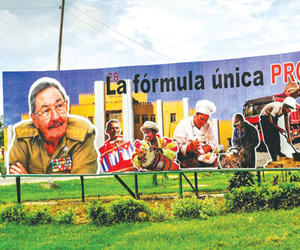Cuba marks 60 years since revolution’s spark
- Submitted by: lena campos
- Santiago de Cuba
- 07 / 27 / 2013

A propaganda sign showing a portrait of President Raul Castro in Santiago de Cuba. Today is the 60th anniversary of the attack of the Moncada Barracks by a group of revolutionaries led by Fidel Castro, brother of Raul, which is considered as the beginning of the Cuban Revolution.
It may have ended in defeat but the armed attack on the Moncada Barracks in Santiago de Cuba by a group of revolutionaries led by Fidel Castro marked the beginning of what would eventually become the Cuban Revolution.
The date on which the attack took place, July 26 (1953), was adopted by Castro as the name for his revolutionary movement which eventually toppled the dictatorship of Fulgencio Batista in 1959.
Tomorrow, the revolutionary guard around current president Raul Castro will assemble in Santiago de Cuba to celebrate the 60th anniversary of the assault, which eventually led to the communists seizing power. Only ailing revolutionary leader Fidel Castro is likely to be missing.
The pomp and ceremony on show will be a far cry from when the then 26-year-old Castro and around 80 other revolutionaries, including his brother Raul, stormed the barracks hoping to overcome the 800-strong garrison of soldiers and eventually topple the Batista dictatorship.
Fifteen soldiers and three policemen were killed during the failed attack while nine rebels lost their lives. Castro subsequently stated that more than 50 rebels were later murdered by the Batista regime.
Castro received a 15-year prison sentence but was released two years later. Batista was finally overthrown in January 1959 following a two-year guerrilla campaign against his regime.
July 26 is celebrated as a national holiday in Cuba and every year party officials assemble to remember the assault on Moncada.
Until 2006 when sickness forced him from office, Castro used the ceremonies to extol the virtues of the victorious Cuban Revolution and launch tirades against outside enemies, namely the US. However, the 86-year-old “Maximo Líder” is now too frail to take to the pulpit.
Castro’s younger brother Raul, who for 50 years quietly and efficiently ran the country’s military, is more publicity shy and pragmatic than his sibling predecessor. Nonetheless, the 82-year-old general will probably still use the occasion to espouse a familiar message to the Cuban people.
“I was not elected president to re-introduce capitalism,” he stated to the people’s congress in February.
Despite the familiar rhetoric, Raul Castro has implemented change since taking power in 2006. Cubans can now own mobile phones and computers while more and more private companies continue to open on the Caribbean island.
There are now nearly 430,000 so-called “Cuentapropistas” (self-employed persons) in Cuba but the gap between these entreprenuers, Cubans who receive money from relatives living abroad and the majority who continue to live on state wages of around $20 a day increases to grow.
The hope of creating a classless socialist society may have disappeared but the government battles against the tide, with its wide-reaching education system and free healthcare.
The Communist Party remains the only accepted political power in the country as the government continues to refuse to introduce any kind of political reforms.
“When will political difference be decriminalised?” asks 37-year-old opposition political blogger Yoani Sanchez. For years, the 37-year-old has complained that the communist regime has denied Cuba’s younger generation access to power out of fear of their ideas.
In recent days, dissident Jose Daniel Ferrer reported the arrest of activists belonging to his political movement UNPACU. Ferrer’s peaceful protest movement is particularly active in the former revolutionary stronghold of Santiago de Cuba. - DPA
Source: Gulf-times.com
Comments